专四专八好课
经典
专四备考规划
0元
专四水平测试
5分钟
英语专四全程班
特惠
专八备考规划
0元
专八水平测试
5分钟
英语专八全程班
特惠
零基础英语速升
考研好课特惠
介绍
专四专八历年真题
免费
2014英语专四真题详解
专四真题是考生们参考复习的重要资料,新东方在线专四频道整理了2014英语专四真题详解希望对考生们有所帮助。
TEST FOR ENGLISH MAJORS (2014) -GRADE FOUR-
TIME LIMIT: 135 MIN
PART I DICTATION [15 MIN]
Please write the whole passage on ANSWER SHEET ONE.
PART II LISTENING COMPREHENSION [20 MIN]
SECTION A CONVERSATIONS
Questions 1 to 3 are based on the following conversation. At the end of the conversation, you will be given 15 seconds to answer the questions. Now, listen to the conversation.
1. What are they mainly talking about in the conversation?
A. Transport. B. Customers. C. Relocation. D. Restaurants.
2. Which of the following is mentioned by Tim as a good reason for moving?
A. More office space. B. Convenient parking.
C. Fewer office workers. D. A near-by train station.
3. Why is Jane worried about winter in the new location?
A. It is much colder there. B. There are few activities.
C. There are no good restaurants. D. There is no cinema or theatre.
Questions 4 to 7 are based on the following conversation. At the end of the conversation, you will be given 20 seconds to answer the questions. Now, listen to the conversation.
4. Miss Parkinson became interested in her own business _______.
A. before she worked for the media company
B. when she was on holiday five years ago
C. after she went to therapists and classes
D. after her friend recommended it to her
5. Why did she ask her teachers to teach her at home?
A. She was busier than before. B. It was more convenient.
C. She liked to exercise at home. D. She was given a promotion.
6. Which of the following is NOT true according to the conversation?
A. She recommended people to take classes.
B. She was willing to pay more for classes at home.
C. She left her job immediately after her promotion.
D. She regarded the business as a pastime at first.
7. Why did she finally leave her job?
A. She got bored with her job. B. She saw an opportunity.
C. She needed the money. D. She was forced to leave.
Questions 8 to 10 are based on the following conversation. At the end of the conversation, you will be given 15 seconds to answer the questions. Now listen to the conversation.
8. Which of the following is NOT mentioned about the single-lens reflex?
A. Different lenses can be used. B. Focusing is easier.
C. You can see what you are taking. D. It is cheaper and lighter.
9. According to the shop assistant, the main difference between the two types of cameras lies in _______.
A. lens B. price C. weight D. size
10. It can be inferred from the conversation that the customer is more likely to buy _______ in the end.
A. a single-lens camera B. nothing
C. a rangefinder camera D. several lenses instead
SECTION B PASSAGES
Questions 11 to 13 are based on the following passage. At the end of the passage, you will be given 15 seconds to answer the questions. Now, listen to the passage.
11. Which of the following details about the front of the house is CORRECT?
A. The front is pink. B. The curtain is drawn.
C. No window can be seen. D. There are two doors.
12. What is to the immediate left side of the house?
A. A washing line. B. Another house. C. A flat area. D. A chimney.
13. Where is the small town in the picture?
A. Between two hills. B. Further to the left of the house.
C. At the back of the house. D. At the side of a hill.
Questions 14 to 17 are based on the following passage. At the end of the passage, you will be given 20 seconds to answer the questions. Now, listen to the passage.
14. When did Ben first become interested in Mongolia?
A. When he grew up. B. When he learned Mongolian.
C. When he returned home. D. When he was nine years old.
15. Where did he spend most of his teenage years?
A. In Mongolia. B. In the Arab world.
C. In his hometown. D. In some other regions.
16. We learn from the passage that Ben _______ while doing his master’s degree.
A. became interested in classical Mongolian
B. learned classical and modern Mongolian
C. gave up modern Mongolian
D. mastered modern Mongolian
17. Which of the following details is NOT true according to the passage?
A. Ben wants to visit Mongolia when the weather is warm.
B. Ben considers the travel expense reasonable.
C. The trip today is expensive considering inflation.
D. Ben was unable to travel to Mongolia in 1971.
Questions 18 to 20 are based on the following passage. At the end of the passage, you will be given 15 seconds to answer the questions. Now, listen to the passage.
18. Which is the height of towers at Sky Greens vertical farm?
A. 9 meters. B. 20 meters. C. 100 meters. D. 40 meters.
19. Which of the following is NOT true according to the passage?
A. The farm sells its vegetables to a local supermarket.
B. The farm uses less water and energy to grow vegetables.
C. The farm causes less pollution in its production.
D. The farm sells at the same price as imported produce
20. According to the passage, one particular advantage of the Sky Green is _______.
A. local climate B. local support C. plan for expansion D. closeness to the city
SECTION C NEWS BROADCAST
Questions 21 and 22 are based on the following news. At the end of the news item, you will be given 10 seconds to answer the questions. Now. listen to the news.
21. According to the passage, Turkish police were unsure about _______.
A. when the woman was killed B. the main cause of the death
C. the woman’s identity D. why she failed to return home
22. How many people had been detained by Turkish police?
A. 9. B. 19. C.22. D. 33.
Questions 23 and 24 are based on the following news. At the end of the news item, you will be given 10 seconds to answer the questions. Now, listen to the news.
23. What is the situation now in Kidal according to the news?
A. Islamist militants are still in control of the town.
B. French forces have entered the town.
C. French are going to land at the airport.
D. Islamist militants are attacking the airport.
24. Why did the French launch the military operation?
A. To control Kidal airport. B. To protect the town.
C. To protect the capital Bamako. D. To fight against Islamist militants.
Questions 25 and 26 are based on the following news. At the end of the news item, you will be given 10 seconds to answer the questions. Now, listen to the news.
25. Which of the following is TRUE about the immigration reform?
A. It was proposed by a group of senators.
B. Mr Obama had carried out the reform.
C. Illegal immigrants would soon be given citizenship.
D. The reform failed to improve the current system.
26. According to Obama’s 2011 blueprint, how long would it take for illegal immigrants to gain citizenship?
A. Eight years. B. Five years. C. Thirteen years. D. Eleven years.
Questions 27 and 28 are based on the following news. At the end of the news item, you will be given 10 seconds to answer the questions. Now, listen to the news.
27. What is Lorraine Melvill’s business?
A. Running a plastic surgery clinic. B. Arranging for surgery and safaris.
C. Providing consultancy to local people. D. Organizing trips to UK and American.
28. Which of the following statements is NOT true according to the news item?
A. Local African clients helped keep her business going.
B. Her clients were unable to pay her the money.
C. Her business was affected by the global financial crisis.
D. She still had as many European clients as before.
Questions 29 is based on the following news. At the end of the news item, you will be given 5 seconds to answer the question. Now, listen to the news.
29. What is the main idea of the news item?
A. Foreign investment in unstable regions. B. BP’s presence in North Africa.
C. Security concerns in risky countries. D. Protection for foreign oil workers.
Questions 30 is based on the following news. At the end of the news item, you will be given 5 seconds to answer the question. Now, listen to the news.
30. What is the main message of the news item?
A. London attracts shoppers from all over the world.
B. Most people in Nigeria live in poverty.
C. Wealthier Nigerians become a big spender.
D. People from the Middle East are the most wealthy.
PART III CLOZE [15 MIN]
The Victorians had become addicted to speed and they wanted to go ever faster. Time was money and efficiency became (31)____ important. Although divisions of labor had been (32)____ by Adam Smith and illustrated by a pin factory in The Wealth of Nations in 1776, (33)____ could now become fully realized. This specialization of labor was in (34)____ contrast to the rural means of production, in (35)____ the family was the means of production, consumption and socialization. (36)____ greater speed came a greater need for industries and businesses to make more and make it quicker. Steam made this (37)____ and changed working life forever (38)____ were the days when work was (39)____ by natural forces: steam engines were servant (40)____ neither season nor sunshine. Factories had foremen and life became correspondingly more (41)____. The clocking-on machine was (42)____ in 1885 and time and motion studies to increase efficiency would be introduced only (43)____ twenty years later. (44)____ it was not all bad news. Agricultural incomes depended on variable harvests and weather. Factories provided (45)____ and predictable income, but long hours.
Working life was becoming increasingly regulated, and the working (46)____ was reorganized to promote ever-greater efficiency. The old (47)____ St. Monday - when no work was done - was (48)____, work stopped around midday on Saturday and did not resume (49)____ Monday morning. A new division between “work” and “leisure” emerged, and this new block of weekend leisure time coincided with the development of spectator sports like cricket and football, and the (50)____ of music hall entertainment for the new working classes.
31. A. increasingly B. surprisingly C. slowly D. obviously
32. A. contributed B. informed C. spread D. conceived
33. A. he B. it C. these D. those
34. A. clear B. marked C. apparent D. firm
35. A. that B. what C. where D. which
36. A. Upon B. Over C. With D. For
37. A. possible B. practical C. worthwhile D. useful
38. A. Passed B. Lost C. Gone D. Missed
39. A. defined B. controlled C. limited D. dictated
40. A. over B. on C. by D. to
41. A. standard B. controlled C. difficult D. dreadful
42. A. designed B. created C. invented D. bought
43. A. some B. certain C. these D. those
44. A. For B. But C. Consequently D. Accordingly
45. A. safe B. good C. continuous D. secure
46. A. week B. period C. pattern D. practice
47. A. culture B. behaviour C. custom D. habit
48. A. repair B. compensate C. mend D. moderate
49. A. before B. until C. on D. after
50. A. raise B. increase C. trend D. present
PART IV GRAMMAR & VOCABULARY [15 MIN]
51. It is essential that he ________ all the facts first.
A. is examining B. will examine C. examines D. examine
52. Which of the following sentences expresses a future action?
A. Lucy is continually finding fault with her sister.
B. We are meeting the visitors after the performance.
C. The coach is now crossing the Garden Bridge.
D. I’m hoping that you’ll give us some advice.
53. Which of the following italicized parts is used as an object complement?
A. The front door remained locked. B. The boy looked disappointed.
C. Nancy appeared worried. D. He seemed to have no money left.
54. Which of the following sentences is INCORRECT?
A. Physics is an important school subject. B. The Niagara Falls is in North America.
C. The United States borders Canada. D. Mumps is a kind of infectious disease.
55. Which of the following sentences indicates POSSIBILITY?
A. The moon cannot always be at the full. B. You cannot smoke inside the building.
C. He cannot come today. D. She cannot play the piano.
56. The boys in the family are old enough for ________.
A. schools B. school C. the school D. the schools
57. Which of the following italicized parts indicates a predicate-object relationship?
A. He was reading Mary’s letter in the room.
B. You can buy men’s shoes in this shop.
C. Mrs. Black’s passport was lost.
D. The enemy’s defeat brought the war to an end.
58. Please pardon ________ you.
A. my disturbing B. disturbing me C. to disturb D. that I disturb
59. Which of the following tag questions is INCORRECT?
A. Carry this parcel for me, will you? B. Nobody wants to go there, does he?
C. Few people know him, don’t they? D. Everything is ready, isn’t it?
60. Which of the following reflexive pronouns(反身代词)is used as an object?
A. I spoke to the president himself. B. Frank is not quite himself today.
C. Linda herself will play the violin. D. You must pull yourself together.
61. The research team can handle ________ needs to be handled.
A. whenever B. whichever C. wherever D. whatever
62. Which of the following italicized parts modifies an adverb?
A. I rather like my teacher. B. That was a very funny film.
C. Do it right now. D. We walked about 6 miles.
63. When the sentence “They had made a mess of the house” is turned into passive voice, which of the following is CORRECT?
A. A mess had been made in the house. B. A mess had been made by them.
C. The house had been made a mess of. D. The house had been made a mess.
64. Fool ________ Michael is, he could not have done such a thing.
A. as B. who C. that D. like
65. When the sentence “Shall I drive you to the airport first?” is turned into indirect speech, which of the following is most appropriate?
A. He agreed to drive me to the airport first.
B. He offered to drive me to the airport first.
C. He advised me to go to the airport first.
D. He suggested that I drive to the airport first.
66. The interviewers were impressed by the high calibre of the applicants for the job. The underlined part means ________.
A. criterion B. quality C. qualification D. level
67. Her career has ________ a number of activities —composing, playing and acting.
A. held B. produced C. embraced D. combined
68. The operation could ________ her life by two or three years.
A. prolong B. increase C. expand D. continue
69. All her cousins and their children have fair hair. The underlined part means ___.
A. fine B. dark C. thick D. light
70. John always feels sluggish first thing in the morning. The underlined part means ________.
A. sick B. inactive C. dizzy D. drowsy
71. The family of the victim had to endure a long wait before the case cane to trial. The underlined part means ________.
A. tolerate B. keep C. face D. hold
72. The chief of surgery became committee chairman by virtue of ________.
A. seniority B. service C. age D. rank
73. He turned his back on them when they most needed him. The underlined part means ________.
A. criticized B. ignored C. betrayed D. deceived
74. Our school did not ________ for Christmas until mid-December.
A. break out B. break down C. break up D. break in
75. The flags in the stadium ________ in the wind.
A. flapped B. moved C. shook D. stirred
76. His mother retired early on account of poor health. The underlined part means ________.
A. despite B. with C. according to D. because of
77. The whole country was in ________ over the result of the elections.
A. suspension B. suspense C. suspending D. suspender
78. There is no conceivable reason why there should be any difficulty during the project. The underlined part can be replaced by all the following EXCEPT ________.
A. thinkable B. imaginable C. possible D. observable
79. The employers prepared, with all due ________ for a conference with the Trade Unions.
A. caution B. concern C. certainty D. consideration
80. Our experiment was conducted under optimal conditions. The underlined part means ________.
A. perfect B. proper C. possible D. proposed
PART V READING COMPREHENSION [25 MIN]
TEXT A
After breakfast the boys wandered out into the play-ground. Here the day-boys were gradually assembling. They were sons of the local clergy, of the officers at the Depot, and of such manufacturers or men of business as the old town possessed. Presently a bell rang, and they all trooped into school. This consisted of a large, long room at opposite ends of which two under masters conducted the second and third forms, and of a smaller one, leading out of it, used by Mr. Watson, who taught the first form. To attach the preparatory to the senior school these three classes were known officially, on speech days and in reports, as upper, middle, and lower second. Philip was put in the last. The master, a red-faced man with a pleasant voice, was called Rice; he had a jolly manner with boys, and the time passed quickly. Philip was surprised when it was quarter to eleven and they were let out for ten minutes' rest.
The whole school rushed noisily into the play-ground. The new boys were told to go into the middle, while the others stationed themselves along opposite walls. They began to play Pig in the Middle. The old boys ran from wall to wall while the new boys tried to catch them: when one was seized and the mystic words said - one, two, three, and a pig for me - he became a prisoner and, turning sides, helped to catch those who were still free. Philip saw a boy running past and tried to catch him, but his limp gave him no chance; and the runners, taking their opportunity, made straight for the ground he covered. Then one of them had the brilliant idea of imitating Philip’s clumsy run. Other boys saw it and began to laugh; then they all copied the first; and they ran round Philip, limping grotesquely, screaming with shrill laughter. They lost their heads with the delight of their new amusement, and choked with helpless merriment. One of them tripped Philip up and he fell, heavily as he always fell, and cut his knee. They laughed all the louder when he got up. A boy pushed him from behind, and he would have fallen again if another had not caught him. The game was forgotten in the entertainment of Philip’s deformity. Philip was completely scared. He could not make out why they were laughing at him. His heart beat so that he could hardly breathe, and he was more frightened than he had ever been in his life. He stood still stupidly while the boys ran round him, mimicking and laughing; they shouted to him to try and catch them; but he did not move. He did not want them to see him run any more. He was using all his strength to prevent himself from crying.
81. From the beginning of the passage we learn that ________.
A. some pupils came from the local area B. the school only accepted day-boys
C. the school had only three classes D. Philip’s class was part of the senior school
82. What was Philip’s reaction to his class?
A. He thought class was too short. B. He found his class surprising.
C. He seemed to have enjoyed it. D. He wanted to change class.
83. In the game Philip lost his ground because ________.
A. the game wasn’t fit for new boys like him
B. the playground wasn’t big enough for the game
C. he did not know the rules of the game
D. he could not run as quickly as other boys
84. What did the boys do after Philip lost his ground?
A. They continued with the game. B. They stopped to make fun of him.
C. They changed to another game. D. They stopped and went inside.
85. How did Philip feel in the end?
A. He was ashamed of himself. B. He was very nervous.
C. He was really horrified. D. He felt himself stupid.
TEXT B
For parents who send their kids off to college saying, “These will be the best years of your life,” it would be very appropriate to add, “If you can handle the stress of college life.”
Freshmen are showing up already stressed out, according to the latest research study that reported students’ emotional health levels at their lowest since the survey started in 1985. While in school, more students are working part-time and near-full-time jobs.At graduation, only 29 percent of seniors have jobs lined up.
Pressure to excel often creates stress, and many students are not learning how to effectively handle this stress. Let me show five facts that I believe every college student should know about stress.
First, stress can make smart people do stupid things. Stress causes what brain researchers call “cortical inhibition.” In simple terms, stress inhibits a part of the brain responsible for decision-making and reaction time and can adversely affect other mental abilities as well.
Second, the human body doesn’t discriminate between a big stressful event and a little one. Any stressful experience will create about 1,400 biochemical events in your body. If any amount of stress is left unchecked, many things can occur within the body, including premature aging, impaired cognitive function and energy drain.
Third, stress can become your new pattern. When you regularly experience negative feelings and high amounts of stress, your brain recognizes this as your normal state. This then becomes the new norm, or baseline for your emotional state.
Fourth, stress can be controlled. Countless studies demonstrate that people can restructure their emotional state using emotion-refocusing techniques. These techniques help you recognize how you are feeling and shift to a more positive emotional, mental and physical state.
One technique involves slowing your thoughts and focusing on your heartbeat, breathing slowly and deeply, and focusing on the positive feeling that you receive.
Finally, stress can be lessened by loving what you study. Barbara Frederickson, a leading international authority on the importance of positive emotions, says humans are genetically programmed to seek positive emotions such as love and joy. It's suggested to choose a major or career path you love and enjoy. Otherwise, you could end up fighting against your own biology.
86. The author cites the latest research study in order to show that ________.
A. students are studying harder in college
B. most students have part-time job now
C. stress continues to the time of graduation
D. students only feel stressed while in school
87. According to the passage, stress might cause all the following negative effects EXCEPT ________.
A. social B. mental C. emotional D. physical
88. In the author’s opinion, stress can be controlled by ________.
A. doing what you prefer B. identifying your present emotional state first
C. finding a more positive feeling first D. focusing on your emotional state
89. According to the context, what does “your own biology” mean in the last paragraph?
A. Your current major. B. Your future job.
C. Your future research. D. Your preference.
90. Which of the following is the best as the title of the passage?
A. Causes of Stress. B. Type of Stress.
College C. Life and Stress. D. Stress and Control Methods.
TEXT C
For anyone who doubts that the texting revolution is upon us, consider this: The average 13- to 17-year-old sends and receives 3,339 texts a month—more than 100 per day, according to the Nielsen Co., the media research firm. Adults are catching up. People from ages 45 to 54 sent and received 323 texts a month in the second quarter of 2010, up 75% from a year ago, Nielsen says.
Behind the texting explosion is a fundamental shift in how we view our mobile devices. That they are phones is increasingly beside the point.
Part of what's driving the texting surge among adults is the popularity of social media. Sites like Twitter, with postings of no more than 140 characters, are creating and reinforcing the habit of communicating in micro-bursts.
Economics has much to do with texting’s popularity. Text messages cost carriers less than traditional mobile voice transmissions, and so they cost users less. Sprint Nextel has reconceived its Virgin Mobile brand to cater to heavy texters in a difficult economy. For $25 per month, users get unlimited texting, email, social networking and 300 talk minutes; for another $15, they get an additional 900 talk minutes. The name of the brand's new wireless plan: “Beyond Talk.”
Texting’s rise over conversation is changing the way we interact, social scientists and researchers say. We are now inclined to text to relay difficult information. We stare at our phone when we want to avoid eye contact. Rather than make plans in advance, we engage in what research have named “micro-coordination”—”I’ll txt u in 10mins when I know wh/ restrnt.”
Texting saves us time, but it steals from quiet reflection. “When people have a mobile device and have even a little extra time, they will communicate with someone in their life,” says Lee Rainie, director of the Pew Internet and American Life Project.
And the phone conversation will never be completely obsolete. Deal makers and other professionals still spend much of the day on the phone. Researchers say people are more likely to use text-based communications at the preliminary stages of projects. The phone comes into play when there are multiple options to consider or important decisions to be made.
91. At the beginning of the passage, the author uses figures for the purpose of ________.
A. introduction B. comparison C. explanation D. transition
92. According to the context, which of the following is closest in meaning to “beside the point”?
A. Unimportant. B. Unacknowledged. C. Underestimated. D. Undeniable.
93. Which of the following is NOT mentioned as a cause for texting’s popularity?
A. Promotion of cheaper wireless packages.
B. Increase in the number of adult texters.
C. Redesign of mobile devices.
D. Rise of social media.
94. According to the passage, texting can help people to ________.
A. face difficult situations B. make appointments in advance
C. communicate wish strangers D. avoid awkward situations
95. What is the passage mainly about?
A. Texting’s popularity and effect. B. Role of texting in business.
C. Preference to texting over thinking. D. Innovation of mobile devices.
TEXT D
The healthy adolescent boy or girl likes to do the real things in life, to do the things that matter. He would rather be a plumber’s mate and do a real job that requires doing than learn about hydrostatics sitting at a desk, without understanding what practical use they are going to be. A girl would rather look after the baby than learn about child care. Logically we should learn about things before doing them and that is presumably why the pundits enforce this in our educational system. But it is not the natural way-nor, I venture to think, the best way. The adolescent wants to do things first for only then does he appreciate the problems involved and want to learn more about them.
They do these things better in primitive life, for there at puberty the boy joins his father in making canoes, patching huts, going out fishing or hunting. He is serving his apprenticeship in the actual accomplishments of life. It is not surprising that anthropologists(人类学家) find that the adolescents of primitive communities do not suffer from the same neurotic(神经质的) “difficulties” as those of civilized life. This is not, as some assume, because they are permitted more sexual freedom, but because they are given more natural outlets for their native interests and powers and are allowed to grow up freely into a full life of responsibility in the community.
In the 19th century this was recognized in the apprenticeship system, which allowed the boy to go out with the master carpenter, or ploughman, to engage in the actual work of carpentry or roof-mending, and so to learn his trade. In some agricultural colleges at the present time young men have to do a year’s work on a farm before their theoretical training at college. The great advantage of this system is that it lets the apprentice see the practical problems before he sets to work learning how to solve them, and he can therefore take a more intelligent interest in his theoretical work.
Since more knowledge of more things is now required in order to cope with the adult world, the period of growing-up to independence takes much longer than it did in a more primitive community, and the responsibility for such education, which formerly was in the hands of the parents, is now necessarily undertaken by experts at school. But that should not make us lose sight of the basic principle, namely the need and the desire of the adolescent to engage responsibly in the real pursuits of life and then to learn how —to learn through responsibility, not to learn before responsibility.
96. According to the author, what is the natural way of education?
A. Doing things while learning. B. Doing things as an apprentice.
C. Doing things before learning. D. Learning practical knowledge first.
97. The main advantage of the natural way of education, whether in primitive or modern times, is that learners ________.
A. can learn the trade through solving problems at work
B. can work with their masters throughout their learning
C. are given more freedom in doing things and learning
D. are given opportunities to develop their interest first
98. According to the context, “this” in the third paragraph refers to ________.
A. the way of learning in primitive communities
B. the difficulties modern adolescents experience
C. the amount of freedom in learning in primitive life
D. the kind of skills boys learned from their father
99. According to the author, learning should now be done in school for all the following reasons EXCEPT that ________.
A. more subjects are to be covered
B. more parents should be involved in teaching
C. there should be a deeper understanding of a subject
D. more time is needed for becoming independent
100. Which of the following best sums up the author’s main point?
A. The apprenticeship system was effective in learning.
B. Students should be given mire freedom in learning.
C. Students develop their interest through learning.
D. Learning to solve problem is learning through responsibility.
PART VI WRITING [45 MIN]
SECTION A COMPOSITION [35 MIN]
An undergraduate of English at a university, in a recent letter to the university’s president, complained about the mandatory maths classes he had to take. He said that because a language major has little use for maths, he would forget all of his maths lessons soon after taking the required exams. What do you think of this opinion?
Write on ANSWER SHEET THREE a composition of about 200 words on the following topic:
Should English Majors Study Maths?
You are to write in three parts.
In the first part, state specifically what your opinion is.
In the second part, provide one or two reasons to support your opinion.
In the last part, bring what you have written to a natural conclusion or make a summary.
Marks will be awarded for content, organization, language and appropriateness. Failure to follow the instructions may result in a loss of marks.
SECTION B NOTE-WRITING [10 MIN]
Write on ANSWER SHEET THREE a note of about 50-60 words based on the following situation:
As you are taking an exam, you do not have time to meet a former schoolmate of years at the railway station. Write a note to your friend Mark/Lily, politely asking him/her to meet your schoolmate for you and describing briefly what your schoolmate looks like.
Marks will be awarded for content, organization, language and appropriateness.
—THE END—
2014英语专四真题答案详解
TEST FOR ENGLISH MAJORS (2014)-GRADE FOUR-2014年英语专业四级参考答案
PART I DICTATION
Limiting the growth of technology throughout history man has changed his physical environment to improve his way of life. With the tools of technology man has altered many physical features of the earth. He has transformed wood lands into farmland: He has modified the face of the earth by cutting through mountains to build roads and railways. However these changes in the physical environment have not always had beneficial results. Today, pollution of the planet. Each day, thousands of tons of gases come out of the vehicles: smoke from factories pollutes the air of industrialized areas and the surrounding countryside. The air in cities is becoming increasingly unhealthy. The pollution of water is equally harmful. In the sea, pollution from oil is killing a lot of sea plant and fish. It is now necessary for man to limit the growth of technology in order to survive on the earth.
PART II LISTENING COMPREHENSION SECTION A 1-5. CBBBD 6-10. CCDBC;
SECTION B 11-15. BAADB 16-20. BCACB; SECTION C 21-25. BABBB 26-30. CBBAC
PART III CLOZE 31-35. ADBBD 36-40.CACDD 41-45.BCABD 46-50.ACCBA
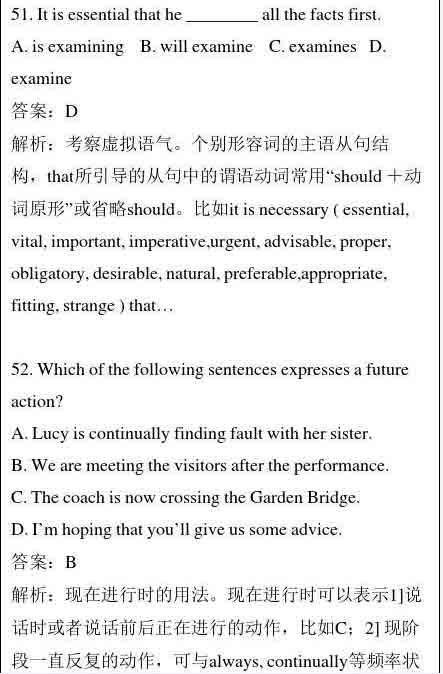
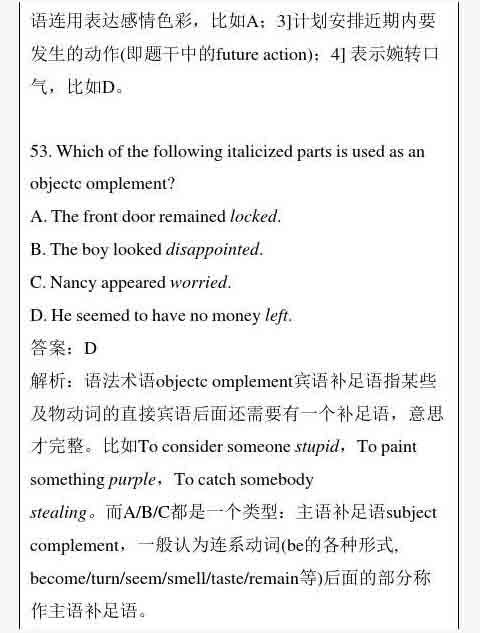
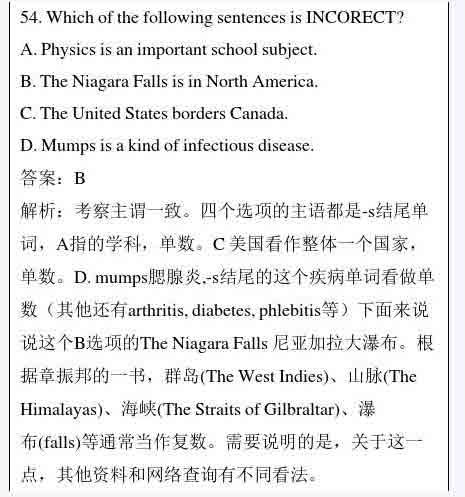
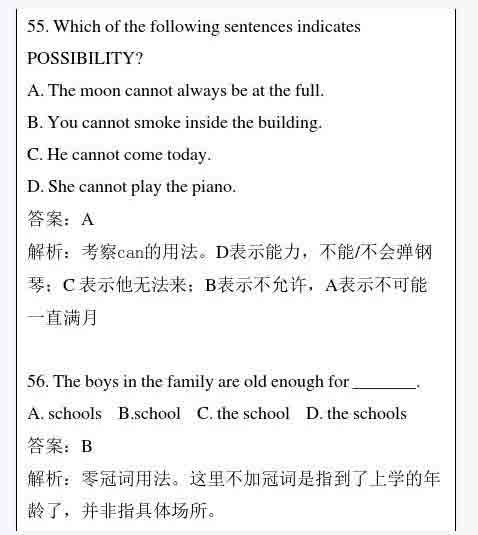
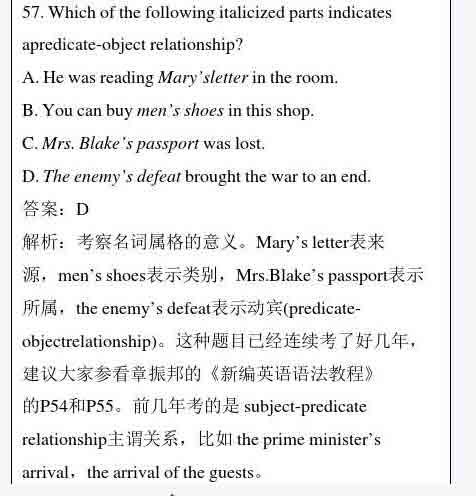
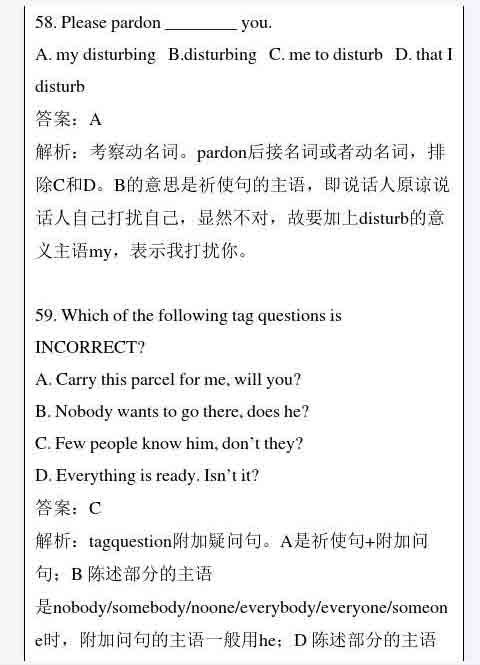

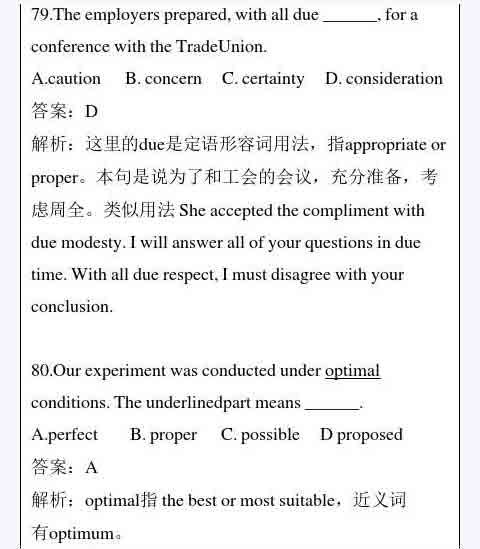
PART IV GRAMMAR & VOCABULARY 51-55. DBDBA 56-60. BDACD
61-65. DCCAB 66-70. BDADB 71-75. AABCA 76-80. DBDDA
PART V READING COMPREHENSION A) 81-85.CADBC; B) 86-90.CABDC;
C) 91-95.AACDA; D) 96-100. CDABD
PART IV GRAMMAR & VOCABULARY 答案详解
PART VI WRITING
SECTION A COMPOSITION
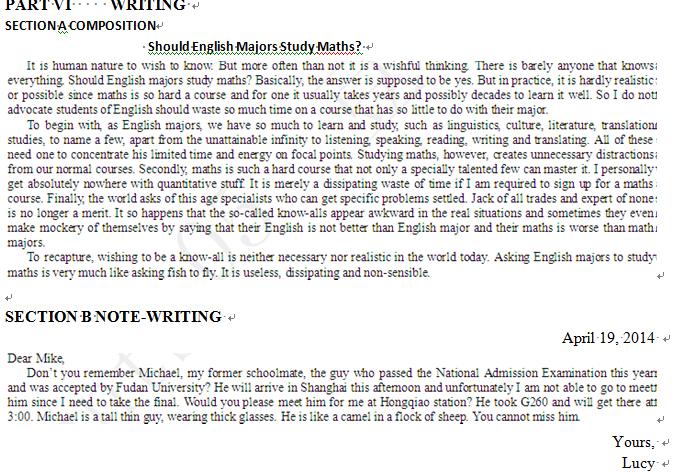
专四专八:精选好课 暖心助学
本文关键字: 2014英语专四真题详解 专四真题答案

 资料下载
资料下载
专八听力训练:时政短语热点【word版】
发布时间:2020-04-01关注新东方在线服务号
回复【专八听力】获取
专八翻译模拟练习题总结
发布时间:2020-04-01关注新东方在线服务号
回复【专八翻译】获取
专四专八写作必备高级词汇
发布时间:2020-04-01关注新东方在线服务号
回复【专八作文】获取
专四听力听写练习50篇文本文档
发布时间:2020-04-01关注新东方在线服务号
回复【专四听力】获取
2021专四写作高级范文15篇集锦
发布时间:2020-04-01关注新东方在线服务号
回复【专四写作】获取
专八基础词汇积累完整版(169页全)
发布时间:2019-12-26关注新东方在线服务号
回复【专八词汇】获取
英语专业四级词汇PDF电子版
发布时间:2019-12-26关注新东方在线服务号
回复【专四词汇】获取
近十年专八真题答案及听力原文
发布时间:2019-12-26关注新东方在线服务号
回复【专八真题】获取
近十年专四真题答案及听力原文
发布时间:2019-12-26关注新东方在线服务号
回复【专四真题】获取

关注新东方在线服务号
关注新东方在线服务号,
免费获取专四专八必看干货资料

 推荐阅读
推荐阅读
题目:50 When you re driving on a motorway, you must obey the signs telling you to get into the right______ [A] way [B] track [C] road [D] lane
来源 : 新东方在线 2022-07-20 18:45:00 关键字 :
题目:49 The_______of the word is unknown, but it is certainly not from Greek
来源 : 新东方在线 2022-07-20 18:44:00 关键字 :
题目:48 Being colour-blind, Sally can t make a______between red and green [A] difference [B] distinction [C] comparison [D] division
来源 : 新东方在线 2022-07-20 18:42:00 关键字 :
题目:47 During the reading lesson, the teacher asked students to read a few_____from the novel [A] pieces [B] essays [C] fragments [D] extracts
来源 : 新东方在线 2022-07-20 18:40:00 关键字 :
题目:46 The multinational corporation was making a take-over_______for a property company [A] application [B] bid [C] proposal [D] suggestion
来源 : 新东方在线 2022-07-20 18:37:00 关键字 :



 精彩课程推荐
精彩课程推荐
直录播结合,知识点精讲,好老师带学,带你稳稳走好备考路
火热报名
直录播精讲互动二合一,新东方好老师全程带学不迷茫!
火热报名
 资料下载
资料下载
关注新东方在线服务号
回复【专八听力】获取
关注新东方在线服务号
回复【专八翻译】获取
关注新东方在线服务号
回复【专八作文】获取
关注新东方在线服务号
回复【专四听力】获取
关注新东方在线服务号
回复【专四写作】获取
关注新东方在线服务号
回复【专八词汇】获取
关注新东方在线服务号
回复【专四词汇】获取
关注新东方在线服务号
回复【专八真题】获取
关注新东方在线服务号
回复【专四真题】获取

 阅读排行榜
阅读排行榜
 相关内容
相关内容